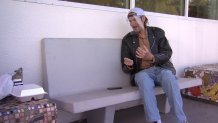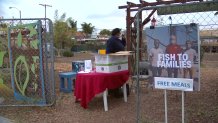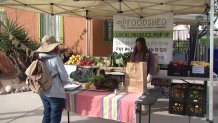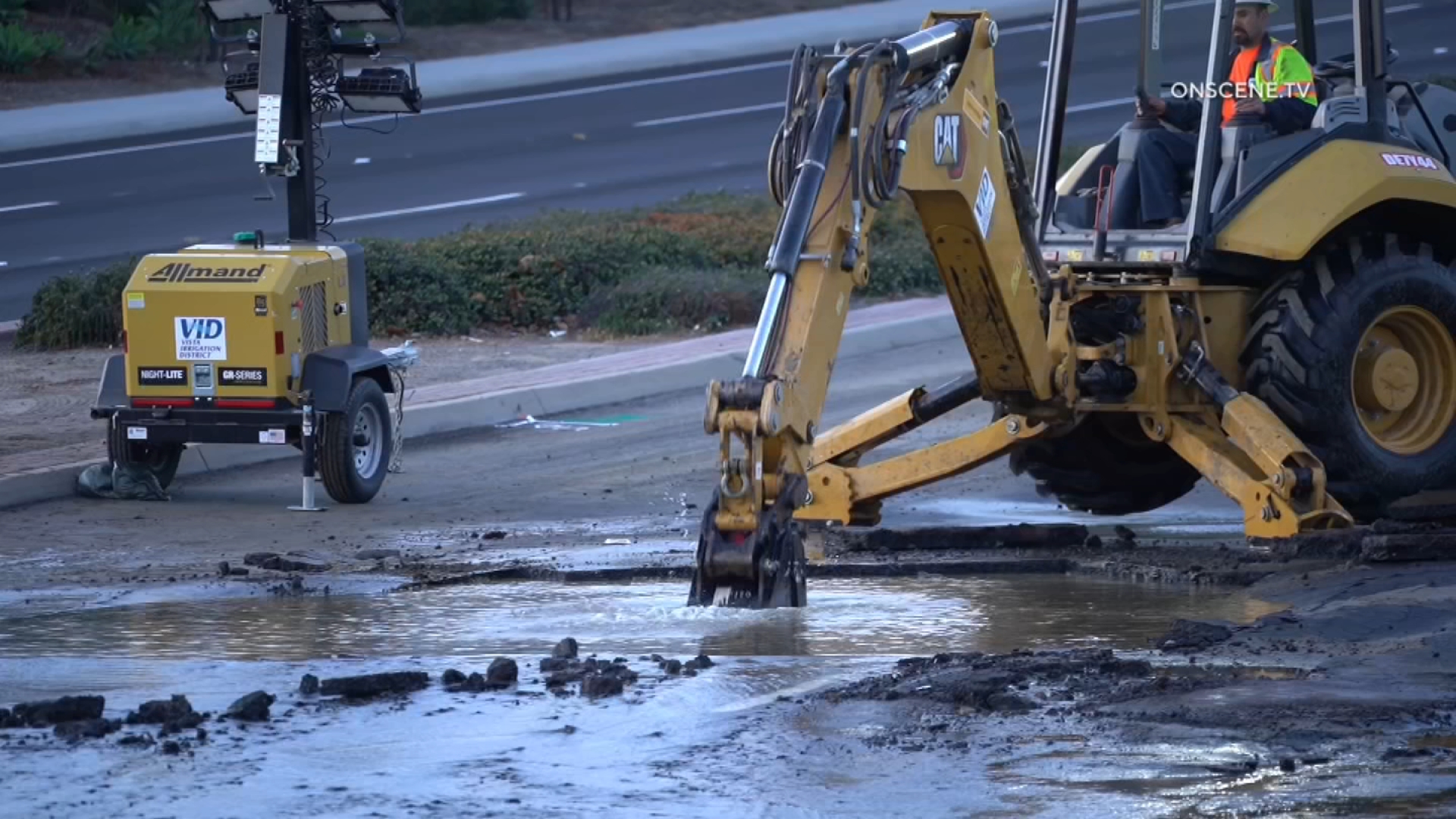A pandemic can bring to surface fractures across many communities, especially when it comes to food insecurities. With rising unemployment rates, many families across San Diego County struggle to access affordable, healthy food daily.
But while the pandemic has highlighted problems with food access, it has also revealed the resilience of communities and neighbors looking out for one another. Communities are coming together to face the stomach-aching reality head-on.
For Steven Dunetz, this is a reality he has been accustomed to, pre-COVID-19.
"I have to rely on places where to eat," Dunetz said. "I rely on that about 70%, which is quite a bit of food."
Dunetz said decades ago he was an actor in Hollywood, but got sick and was forced to retire.
"I got very sick when I was younger, and I had to go on a kidney machine. I finally got a kidney transplant, and I wind up living the life of being a retired guy from acting," he said.
Now, Dunetz, like many other San Diegans, has to rely on food systems, banks, and programs to feed himself week-by-week.

"You get tired and scared of where to go next," Dunetz said. "This is such a bad time of the year -- 2020 and 2021 -- that we don't know where our next meal is going to come from."
"Food Apartheid"
Those tasked with trying to solve San Diego's food insecurities say the numbers of those in need grew in 2020, and they're racing to find solutions. Especially in specific communities where it's not only about affordability but accessibility as well.
"The system is inequitable, especially along racial lines," said Margaret Chiu with San Diego Food System Alliance.
"With food access, you know certain communities and neighborhoods have amazing food access, and have you known an incredible amount of grocery stores and sources to get healthy food while other communities and neighborhoods… suffer really poor access to healthy foods," she explained.
Historically, the U.S. Department of Agriculture has referred to these community pockets as "food deserts" or "low-income census tracts where a substantial number or share of residents has low access to a supermarket or large grocery store."
Chiu said significant changes are needed, and it starts with removing that "food desert" label.
"That term implies a lack of affordable and fresh food is just a geographic problem… The word desert kind of makes it seems like these communities are just devoid of life when they are really, you know, full of resilience," Chiu said.
Chiu added that more advocates are using the label "food apartheid" to describe the problem at hand. Chiu said the effect of systemic historical practices have limited the number of grocery stores nearby.
“The system is inequitable, especially along racial lines,” Chiu said. “Black and Latinx households are much more likely than white households to experience food insecurity and that is largely in part of institutions like redlining -- the practice that segregated neighborhoods about 50 years ago… The effects of that have trickled down.”
Chiu continued, "These communities have found their own ways to really redefine their food systems."
Mt. Hope Community Garden Feeding Its Neighbors
"Redefining a local food system" is the mission for Dian Moss. Moss is the founder of the nonprofit Project New Village and Director of the Mount Hope Community Garden.
Moss said she's never seen a greater need than during the past year.
"I can say to you definitively, I have never seen such long food lines," Moss said, speaking from the Community Garden. "When we saw that the market shelves were empty, this is when this activity really got started."

The Mt. Hope Community Garden grows fresh produce and distributes warm meals to neighbors weekly. The garden partners with the program "Fish to Families," looping in local fishermen into solving the problem of providing fresh food while benefiting their careers.
One day, Moss hopes to open a store.
"I want to grow the biggest orchard of food. I want to make a percentage of that food available to people that need it, but we also are in development where we're putting together a store where we can put food that people can buy," Moss said.
She continued, "It's not necessarily cheap food. It's good food, it's ethically produced, and it's going to be recycling dollars in our community."
On a Thursday evening, while the Mt. Hope Community Garden was handing out meals, a South Bay resident named Helen stood in line. Helen asked us not to use her last name, but her situation is not unfamiliar. She said the pandemic has impacted her and her family's ability to put food on the table.
Helen said on this occasion, she was not only looking for food for her family but others as well.
"The meals are for myself and my mother and some other people that are quarantined," she said. "I help out other families when I can. You know, a neighbor has a child who has cancer, so she can't get out much. You know, anything that helps."
"I haven't worked since March… It's rough, lots of insomnia, anxiety, so you know, little things help. When you help everybody out, that's how you succeed."
'Pay What You Can' Foodshed Connects Farmers to Families in Need
On the corner of 43rd Street and Wightman Street, Foodshed's pop-up farm stand offers fresh, organic produce locally grown on a "pay-what-you-can" scale.
Elle Igoe is not only the founder of the program that has been organizing in City Heights for 15 years, but she's also a local farmer herself. She says addressing people with food insecurities needs to be a priority, and she's doing her part.
"We've tried to find a way to meet everyone in the middle by getting grant funds and donations from folks so that we can meet people where they're at (financially,)" Igoe said. "So some people who have the means today will pay $20 for their bag, and others who don't will pay $1 to $5 for their bag, but it all works out."

For Igoe and other farmers in San Diego County, growing can be expensive. And she believes the answers to some of San Diego's food access problems lie in the food system itself.
"The price of growing local food here in San Diego can be extremely expensive," Igoe said. "The cost of living is very high. And that means farmers often have to price their food at a point that others cannot afford, and that's because also the grocery stores are filled with very subsidized unhealthy foods."
On a Saturday morning back in December, Igoe was practicing social distancing with a smile behind her face mask. Igoe greeted City Heights residents as they approached her stand for fresh produce.
Igoe said the pop-up food stand in December was directly related to the growing need for affordable healthy food options, brought on by COVID-19.
"We started in response to the COVID pandemic because the farmers market was temporarily shut down," Igoe said. "People were having a hard time. You know, it's a little bit scary to go into the grocery store's lines."
Igoe continued, "I think the pandemic has really lifted up awareness of the fact that we need to know where our local food comes from."
With her volunteers, Igoe knows her neighbors in City Heights crave better food. Igoe grew up there and now feels pride in giving back.
"It is a massive undertaking, but block by block, we can make this happen," Igoe said.
The Nutrition Center "Heaven" Offers Warm Meals At Low Rates
Steven Dunetz said he knows all of the food assistance programs in San Diego County. Still, for his money's worth, nothing compares to The Nutrition Center in National City.
"I mean come on, this is like 'Wake me up. Did I come into heaven right now or something?'" Dunetz said, with his Tuesday lunch in hand. "'How did I get here?' I mean it's just incredible."
Since the pandemic hit, The Nutrition Center, run by the city's governing body, has modified its lunch program for pick-up meals only. From 11 a.m. to 12:30 p.m. weekly at 1415 D Avenue, National City, The Nutrition Center services dozens of residents from all over the county.
While waiting in line outside, the program's recipients said the subsidized meals are high quality.
Dunetz said it's also safe, pointing out that he's fearful of violence or catching the virus at some programs in the county.
"You don't know who's got the COVID-19 and who doesn't, so you take a chance," Dunetz said.
For Dunetz, access to affordable and healthy meals is critical.
"I don't drive anymore, and it gets even tougher when you don't drive, and then you need to find a place that is close," Dunetz said.
But it's programs like these that provide hope and security for the vulnerable, like Dunetz. Programs offer fundamentals that most people take for granted— removing feelings of food insecurity and hunger - one person at a time.
"This is where life begins because you get back your life here," Dunetz said.



